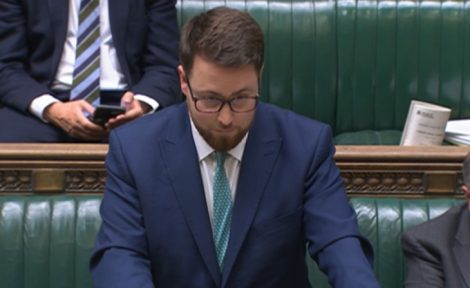As the Renters Reform Bill draws closer it’s time for Ministers to stop ignoring landlords
Goodlord boss William Reeve says that while landlords are unlikely to be winning any popularity contests soon, ignoring them or making them the fall guys for the sector’s woes won’t help anybody.

When you bring up challenges facing the nation’s landlords, few people will bring out the tiny violins. For anyone who’s ever rented, it can sometimes feel as if harbouring feelings of resentment towards your landlord is written into the tenancy agreement.
When times get tough for tenants, landlords are often the easiest target to direct our anger. And right now, times are incredibly tough.
Rising rents and dwindling availability of homes are creating a perfect storm for the nation’s 20 million renters. Some letting agents are seeing over 40 enquiries for each available property.
Landlords are unlikely to be winning any popularity contests.”
Whilst landlords are unlikely to be winning any popularity contests, ignoring them or making them the fall guys for the sector’s woes won’t help anybody.
In fact, it will likely make it worse.
RENTERS’ REFORM BILL
And yet, as the most significant piece of sector legislation in years – the Renters’ Reform Bill – inches its way towards publication, it seems landlords are set to be almost entirely overlooked.
This long-awaited Bill contains a range of changes designed to better support and reinforce the rights of tenants. And quite rightly, too. However, it does almost nothing to address the rising tide of landlords selling up and leaving the market. If we leave this issue unaddressed, no amount of pro-tenant legislation will improve the market. The market will simply collapse.
More landlords are leaving than ever before. They’re being pushed out by a combination of rising mortgage rates, rising costs, and increasing regulation – everything from energy performance upgrades to haphazard licensing requirements. For many, buy-to-let no longer adds up.
When landlords leave the private rented sector, it’s tenants that suffer.”
When landlords leave the private rented sector, it’s tenants that suffer. Supply cannot meet demand. Fewer landlords inevitably means fewer homes available to rent.
This is felt against the backdrop of growing rental numbers as Britain’s population grows and fewer renters are able to transition into home ownership in an era of higher interest rates and rising living costs.
As this demand increases, as a country we have not responded with a building spree to boost the number of available rental homes.
Instead, supply is dwindling with every passing month. The spiral is intensifying. The government’s target to build 300,000 homes a year feels forgotten.
More than 90% of letting agents revealed to us in a recent survey that they saw an increased number of tenants looking for properties in the past year. Tenants reported queues outside viewings and scrambles to overbid for properties. The average cost of rent in England is up by 9% year on year.
HOUSING SUPPLY
Amongst the landlords we spoke to, 79% believe there will be less housing supply in the next five to 10 years. Some 73% of letting agents agreed.
It’s clear that the private housing sector needs to reform. That’s why the long-awaited Renters’ Reform Bill is welcome – when we finally see sight of it.
This crucial piece of regulation is set to overlook the other half of the market.”
However, by all accounts this crucial piece of regulation is set to overlook the other half of the market. Few incentives remain to keep landlords – particularly those with one or two properties (often called ‘accidental landlords’) – in the market.
But that’s not because incentivising landlords whilst protecting tenants is impossible. On the contrary, there are a raft of measures that could be taken but seem likely to go overlooked.
HOUSEBUILDING
The government could, for example, rapidly commit to housebuilding, including enabling growth of the build-to-rent sector. Landlords would welcome grants and tax breaks to help make homes more energy efficient and fit for purpose.
Councils could be made to operate under a “one out, one in” policy – replacing any sold properties with new builds. Better still – how about one out, two in?
Bureaucracy and inconsistency create overheads and stress for landlords.”
Increasing numbers of local authorities view landlord licensing regimes as money spinners. But the bureaucracy and inconsistency create overheads and stress for landlords, frequently proving to be the straw on the camel’s back. A cumbersome licensing regime isn’t attractive for investors and doesn’t reduce living costs for anybody.
Increased stress is also coming from the short time window for energy performance upgrades – with only a few years for landlords to upgrade homes to an EPC “C” rating. Easier for new builds, perhaps, but incredibly difficult for upgrading half the nation’s housing stock that was built before 1982.
RETROFIT WORK
Postponing the shift, offering routes to affordable retrofit work, or allowing “D” and “E” properties to still be rented, but perhaps with a tax penalty, could ease the logistical challenge of this new standard.
And huge numbers of landlords believe the reinstatement of tax relief under section 24 would help keep many in the market.
The Government could also allow rental payments to count towards a tenant’s credit rating, to help facilitate their step up towards home ownership. The list goes on.
Putting so much regulation on landlords with little incentive to also grow the market spells disaster.”
The government’s focus on tenants is admirable. But putting so much regulation on landlords with little incentive to also grow the market spells disaster.
The government and wider market must work with landlords, not against them, if they want to design a better, more sustainable future for renters.
If landlords are continually squeezed out of the sector and no more homes are built, we are letting the country’s future down.
William Reeve is Chief Executive Officer of Goodlord





As a long term landlord, I am greatful to Mr Gove.
He has driven up demand and as a consequence, rents.
The mayor of London is suggesting Rent Control.
Clearly neither of these politicians have studied History of the Private Rented Sector.
There are large numbers of “Mercantile” landlords. They only want the money and have no interest in the People part of being a landlord.
These are the landlords who are forcing up rents to meet the increased cost of their BTL loans, alternatively they are selling up.
This explains the £9 billion extra CGT that Jeremy Hunt has on top of his annual £11bn
It is clear that the politicians “Haven’t got a clue what to do”.
Tenant lobby groups have the ear of Mr Gove, but provide no housing.
Landlords are an easy target.
Time to have a reality check Mr Gove.
I was going to make a comment on current government policy (the term is used loosley of course) then decided no point as they never listen.
Very well said and clearly too. Covers lot of truths.